|
|
|
Sort Order |
|
|
|
Items / Page
|
|
|
|
|
|
|
| Srl | Item |
| 1 |
ID:
167243
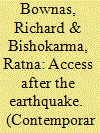

|
|
|
|
|
| Summary/Abstract |
This article examines the aftermath of the Nepal earthquakes of 2015 with special reference to their impact on marginalized communities, in particular Dalit or ‘Untouchable’ communities in Sindhupalchok District, one of the worst affected districts of Nepal. The earthquakes not only took thousands of lives and destroyed property and livelihoods, but their aftermath has revealed the webs of power that shape and limit the opportunities of different communities. Referencing the theoretical approach to access pioneered by (Ribot, J., and N. Peluso. 2003. “A Theory of Access.” Rural Sociology 68 (2): 153–181)the article proceeds to analyze the relative ‘winners and losers’ from the reconstruction process, finding a mixed picture of opportunities and barriers facing the most marginalized communities in the district.
|
|
|
|
|
|
|
|
|
|
|
|
|
|
|
|
| 2 |
ID:
167250
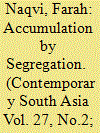

|
|
|
|
|
| Summary/Abstract |
This article is part of a Book Forum review of Ghazala Jamil’s book Accumulation by Segregation (2017). The Book Forum consists of individual commentaries on this text by four interested scholars, followed by a response by the author. The article may be read individually or alongside the other contributions to the Forum, which together constitute a comprehensive discussion of the themes and arguments in the book.
|
|
|
|
|
|
|
|
|
|
|
|
|
|
|
|
| 3 |
ID:
167254
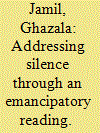

|
|
|
|
|
| Summary/Abstract |
This article is part of a Book Forum review of Ghazala Jamil’s book Accumulation by Segregation (2017). The Book Forum consists of individual commentaries on this text by four interested scholars, followed by a response by the author. The article may be read individually or alongside the other contributions to the Forum, which together constitute a comprehensive discussion of the themes and arguments in the book.
|
|
|
|
|
|
|
|
|
|
|
|
|
|
|
|
| 4 |
ID:
167242
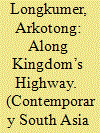

|
|
|
|
|
| Summary/Abstract |
The aim of this paper is to examine the story of the American Baptists and how their mission activities in the Naga Hills District (1871–1955) have impacted upon present day politics in the Indian state of Nagaland. Baptists make up nearly 95% of the current Naga population in Nagaland. The paper will investigate the relationship between the Baptist mission’s philosophy on education, Christian conversion and the subsequent rise of a sense of ‘national community’ amongst the Nagas. Although the primary motivation for the American missionaries was to convert, the British administrators also thought that introducing Christianity would prevent influence on these tribes from Hindu and Muslim groups. Thus began Christianity’s part in a developing framework for resistance in this region, raising significant questions with regard to Christianity’s persistence as a form of political articulation in contemporary Nagaland. This political articulation, I suggest, is related to a greater sense of agency brought about by Christianity and Missionary activities in the fields of education and print. The American Baptist Foreign Mission Society (ABFMS) was at the forefront of these changes.
|
|
|
|
|
|
|
|
|
|
|
|
|
|
|
|
| 5 |
ID:
167253
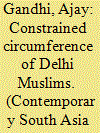

|
|
|
|
|
| Summary/Abstract |
This article is part of a Book Forum review of Ghazala Jamil’s book Accumulation by Segregation (2017). The Book Forum consists of individual commentaries on this text by four interested scholars, followed by a response by the author. The article may be read individually or alongside the other contributions to the Forum, which together constitute a comprehensive discussion of the themes and arguments in the book.
|
|
|
|
|
|
|
|
|
|
|
|
|
|
|
|
| 6 |
ID:
167251
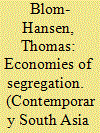

|
|
|
|
|
| Summary/Abstract |
This article is part of a Book Forum review of Ghazala Jamil's book Accumulation by Segregation (2017). The Book Forum consists of individual commentaries on this text by four interested scholars, followed by a response by the author. The article may be read individually or alongside the other contributions to the Forum, which together constitute a comprehensive discussion of the themes and arguments in the book.
|
|
|
|
|
|
|
|
|
|
|
|
|
|
|
|
| 7 |
ID:
167245
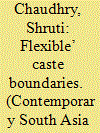

|
|
|
|
|
| Summary/Abstract |
Based on ethnographic fieldwork in a village in the north Indian state of Uttar Pradesh, this article focuses on cross-regional marriage (those that cross caste and linguistic boundaries and entail long-distance migration) as mixed marriage. It queries the ‘acceptance’ of women sought beyond traditional boundaries of caste in a context where caste endogamy is the norm and breaches are otherwise not tolerated. It argues that while the caste of the women is overlooked when the alliance is made, their caste does not cease to be a concern in the caste-bound rural communities into which they marry. A discourse of caste, centred on food transactions, derogatory remarks about skin colour and in the refusal to marry the children of cross-regional couples, serves to mark difference and make claims to status. While there has been a decline in certain exclusionary caste practices in the village, a sense of hierarchy is retained.
|
|
|
|
|
|
|
|
|
|
|
|
|
|
|
|
| 8 |
ID:
167247


|
|
|
|
|
| Summary/Abstract |
Sri Lankan apparel factories claim to be at the vanguard of ethical production on the global supply chain. Both to produce this image and to project their status as fair employers, industrialists offer health services at factory settings. This article focuses on two factory sites that have permanent qualified nurses to attend to illness and injuries, and medical doctors that visit twice a week. While on the face of it, these efforts are commendable, what my fieldwork signalled was that occupational health issues were inseparable from the creeping privatization of health care systems. Injuries or illnesses not treated within a ‘reasonable’ time frame were invariably referred to the private clinics of medical doctors. Ironically, this pattern is bolstered by the proliferation of what one worker described as ‘imaginary’ illnesses – that is, illnesses that workers concoct as a form of respite from the intense pressures of working in this sector. In this paper, I examine the ways in which workers get treated and how it is connected to an increasingly unregulated privatized landscape of healthcare. These shifts also show how the perspectives of citizenry change, despite the social welfare achievements around health and longevity of Sri Lankans.
|
|
|
|
|
|
|
|
|
|
|
|
|
|
|
|
| 9 |
ID:
167246
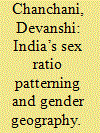

|
|
|
|
|
| Summary/Abstract |
From an interpretation of gender relations in the Chhattisgarhi plains of central India, this paper contributes to theoretical debates on the regional geography of female autonomy and its economic or cultural underpinnings. It seeks to unpack the multi-layered dynamic of gender relations in Chhattisgarh that defy easy generalisation. Kinship systems for non-adivasi groups follow important ‘northern’ or exogamous principals, which are argued, by Dyson and Moore’s thesis, to be unfavourable to female power or autonomy. Counter-intuitively, gender relations are relatively egalitarian when judged by indicators such as sex ratio, and attitudes towards female sexuality or remarriage, while son-preference in the family composition finds a sharp expression. Whereas Chhattisgarh displays unique cultural characteristics, the dependence on women’s labour in the state’s rice-based agrarian economy may make women’s position less susceptible to subordination, and conceivably mitigate the predicted unfavourable-to-women effects of exogamous marriage.
|
|
|
|
|
|
|
|
|
|
|
|
|
|
|
|
| 10 |
ID:
167244


|
|
|
|
|
| Summary/Abstract |
This paper provides one of the most accurate estimates of the size of the Indian middle class, using an eclectic set of variables rooted in three major theories of class; Marxist, Weberian, and Bourdieuian. Using this original and theoretically inclusive method offers a solution to the problem of capturing the conceptual complexities of the middle class and provides a holistic examination of its composition. Through statistical analysis of the India Human Development Survey II (2011–12), the paper reveals three significant findings: firstly, it calculates the size of the middle class to be 28.05% of the urban and rural population in India. Secondly, it demonstrates that despite the occupational diversity that exists among middle classes, a large proportion of the middle class are salaried employees. Thirdly, and most importantly, it demonstrates that contrary to common assumptions in the growing literature on the middle class, a considerable segment of the Indian middle class resides in rural areas.
|
|
|
|
|
|
|
|
|
|
|
|
|
|
|
|
| 11 |
ID:
167241


|
|
|
|
|
| Summary/Abstract |
Sri Lanka has recently seen an upsurge in aggression towards ethnic minorities, and Muslims in particular, by newly formed extremist Sinhala-Buddhist nationalist groups. The politicisation of Buddhism is not new but the development and use of social media for political purposes and for advancing ethno-nationalist agendas is a recent feature of Sri Lankan public and political life. This study explores the parallel emergence of new media technologies and the most recent forms of ethno-nationalism among Sri Lankan youth. A campaign known as SinhaLe is used as an entry point to explore broader issues of identity, religion and politics. The article uses an anthropological approach that combines digital ethnography with in-depth interviews and pays close attention to individual narratives. The article concludes that social media is offering a new forum for the expression of identity that not only mirrors ‘what is out there’ but also provides opportunities to (re)produce viral politics as a form of ‘everyday nationalism’ created from below.
|
|
|
|
|
|
|
|
|
|
|
|
|
|
|
|
| 12 |
ID:
167249
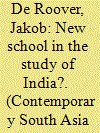

|
|
|
|
|
| Summary/Abstract |
By arguing that a new ‘School’ is crystallising in the study of India, Deborah Sutton (2018, “So called caste: S. N. Balagangadhara, the Ghent School and the Politics of grievance.” Contemporary South Asia 26 (3): 336–349) has brought to the surface phenomena that are typical of any encounter between competing research traditions. Some difficulties of understanding are caused by conceptual change: in the dominant research tradition, ‘Hinduism’ and ‘the caste system’ refer to structures that exist in Indian society; in the research programme developed by Balagangadhara, these terms designate experiential entities embedded in a western cultural experience of India. This conceptual divide also extends to the empirical: because the study of caste and Hinduism is collapsing under the weight of accumulated anomalies, certain problems are crucial to the alternative theorising of the Ghent School, whereas they seem irrelevant to the dominant tradition. Sutton engages in the polemics characteristic of confrontations between competing research traditions. She distorts and domesticates unfamiliar ideas from this School by mapping them onto notions familiar to her. Consequently, she confuses Balagangadhara’s hypotheses about colonial consciousness with hackneyed stories about ‘Orientalism’. The article concludes with a puzzle: Why does Sutton recognise a group of researchers as a new School, while trying to dismiss them as ‘acolytes’ who reproduce the ‘mantras’ and ‘dogmas’ of an Indian thinker?
|
|
|
|
|
|
|
|
|
|
|
|
|
|
|
|
| 13 |
ID:
167252
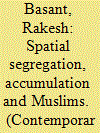

|
|
|
|
|
| Summary/Abstract |
This article is part of a Book Forum review of Ghazala Jamil’s book Accumulation by Segregation (2017). The Book Forum consists of individual commentaries on this text by four interested scholars, followed by a response by the author. The article may be read individually or alongside the other contributions to the Forum, which together constitute a comprehensive discussion of the themes and arguments in the book.
|
|
|
|
|
|
|
|
|
|
|
|
|
|
|
|
| 14 |
ID:
167248
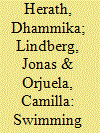

|
|
|
|
|
| Summary/Abstract |
Corruption is endemic, pervasive and embedded in the very fabric in social life in some societies, although its degree varies case to case. Previous academic research and anti-corruption watchdogs have examined corruption in Sri Lanka, where corruption is perceived to be pervasive and endemic but, existing studies are inadequate to explain why corruption occurs and anti-corruption continues to fail in Sri Lanka. In our study, we use the contrasting perspectives of ‘collective action problem’ and the ‘principal-agent’ framework to analyse the dynamics that cause and maintain corruption in Sri Lanka as well as the obstacles and possibilities that people fighting corruption are experiencing. We address this aim in a novel way: our observations and fieldwork in Sri Lanka got us in contact with individuals who made concerted efforts to reveal and oppose corruption at different levels; we call them ‘corruption fighters’. We argue, through the insights from corruption fighters, that corruption represents a ‘collective action problem’ and that to understand why corruption fighters still choose to oppose it, they need to be situated within a discourse of corruption and close attention must be paid to personal motivations and the way they construct meaning in the fight against corruption.
|
|
|
|
|
|
|
|
|
|
|
|
|
|
|
|
|
|
|
|
|